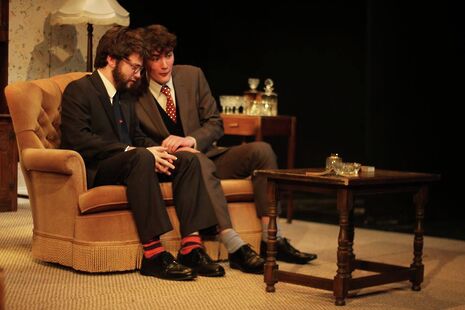Review: Grief
Rachel Bircher is impressed by this devastating portrayal of post-war Britain

Grief is a beautiful look at post-war British society, where “how are you?” is simply a formality and sadness is quickly brushed under the beige coloured rug. It is an impeccably written play with dryness similar to that of Abigail’s Party (also by Mike Leigh). Its plot is motivated by subtleties, not by dramatic events, and it is in its attention to detail where this performance truly excels.
The set was realistic and convincing from the double layer of lounge and hallway to the old fashioned lighter. Costume was used successfully to age the characters and to hint at their personalities, states of mind and classes. I was also impressed by the use of lighting, which came across as well balanced. The lamps were charming details and the stage was often lit from the left as though the last rays of the day were streaming through the set’s window, complimenting the realism of the play.
This attention to detail could also be found in the cast’s interpretation of the script. Activities that could seem trivial were performed attentively to uncover hidden meanings and a few words or a gesture could bring a tear to the eye. I found Dorothy’s (Bea Svistunenko) moments alone especially moving, whereby an act as simple as tidying up subtly implied the character’s isolation.
The general standard of acting was impeccable, with not a weak member of the cast. Never on a Cambridge stage have I seen actors so successfully interpret characters of such a large age difference. Svistunenko was particularly impressive in this respect, creating a perfect picture of repression and hopelessness. Small details were once again revealing, such as the way Dorothy would nervously gaze out of the window after someone left. Raphael Wakefield was also entirely convincing as Edwin. He had the difficult task of playing a character that is both funny and tragically emotionally stunted, which he accomplished with great ease.
The humour was incredibly well delivered in this production, and despite what the title may suggest, there were many moments that had the audience laughing out loud. Through little details and clever delivery, humour was even injected into certain moments of sadness and disappointment. The characters of Gertrude (Ella Konzon), Muriel (Alexandra Wetherell) and Hugh (Louis Norris), mainly there for comic relief, managed to be hilarious parodies of British polite society, while equally being real, complex people.
Grief is most definitely a slow moving play, and whilst the pace was mostly appropriate, it did occasionally drag, most notably towards the end of the first act. Every scene ended slightly abruptly with the same music and the lights going down. A more creative approach to transitions would have been appreciated. While a large number of scenes is necessary to articulate the monotonous passing of time of the characters’ lives, I feel some of the scenes where very little happened could have been combined into longer scenes to enhance the production’s flow.
These transitions were not helped by the choice of music, which I found to be slightly abrasive and too melancholy for a play in which strong emotions are rarely expressed. It would have been lovely to hear some period music or the songs that are obviously important to Dorothy and Edwin. Nevertheless, although the collections of short dry scenes did not always completely flow, they provided lovely contrasts to the more energetic and funny moments of the play.
Overall, Grief is a thoughtful and analytic production that will stay with you long after you leave. Do not go expecting action, but instead go to see exceptionally well-crafted theatre.
 News / Cambridge academics stand out in King’s 2026 Honours List2 January 2026
News / Cambridge academics stand out in King’s 2026 Honours List2 January 2026 Interviews / You don’t need to peak at Cambridge, says Robin Harding31 December 2025
Interviews / You don’t need to peak at Cambridge, says Robin Harding31 December 2025 News / AstraZeneca sues for £32 million over faulty construction at Cambridge Campus31 December 2025
News / AstraZeneca sues for £32 million over faulty construction at Cambridge Campus31 December 2025 Comment / Plastic pubs: the problem with Cambridge alehouses 5 January 2026
Comment / Plastic pubs: the problem with Cambridge alehouses 5 January 2026 News / Cambridge businesses concerned infrastructure delays will hurt growth5 January 2026
News / Cambridge businesses concerned infrastructure delays will hurt growth5 January 2026








